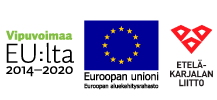In Amber – New power for cleantech Innovations in the Baltic Sea region -project, funded by European regional development fund (ERDF) we asked the local companies in what kind of themes and how they would ideally want to collaborate with us.
In this project we learnerd that all companies are facing business challenges, and with those companies who want to benefit from collaboration, we can take the partnership to the next level and investigate the future opportunities. The concept of business model is useful for any company wanting to invest in critical success factors.
The business model enables a systemic and holistic view
The business model is an emerging as a unit of analysis comprising systemic and holistic view on how firms do business and how the value is created (Zott et al. 2011; Steinhöfel et al. 2018). There are different kinds of conceptualizations for the business models.
The scholars don´t have a consensus on the concept. Osterwalder & Pigneur (2010, 14) define the business model as “the rationale of how an organization creates, delivers, and captures value”. Fielt proceeds with Osterwalder & Pigneur definition, and a proposes that the business model can be defined by the value logic of an organization in terms of how it creates and captures customer value (Fielt 2014). For us, the business model is an umbrella term that includes a variety of issues. The concept is useful to everyday development for all sized of organizations and for different stages of products and services lifecycles.
Anyone can utilize the concept of business model as one can study his or her more specific, own focus area and its interrelations to other parts of the current or a scenario of future business model. When novel products make choices about the market entry strategy, understanding different options regarding the business model is topical. The information about the value chain or possible sources of income can be very valuable. The opportunities related to business models are key to growth, also. However, understanding business models is important in for mature products too as the environment is renewing anyway.

Projects, for example in Horizon Europe -program, offer opportunities for growth-oriented companies to gain new views to their business or products and services. These projects are built in collaboration with business value networks and research partners, and they offer unique learning opportunities to understand for example consumer behavior or value creation opportunities. LAB University of Applied Sciences supports companies in identifying project opportunities and developing meaningful projects.
The business models are constructed in a process
Enterprises have a unique role and ownership in the development of their business models. Research can however help to identify unexplored views. Business models are affected by many things, and some of the changes affect the whole industry, or many industries, such as Covid-19. Some changes are inevitable, but how a company – or the value chain together – can respond, is interesting. Joint sense making processes are important because that is when groups of people – in one company or even in many organizations – can make decisions of high value.
We in LAB are a practical, future-oriented partner for studying business models. Business models are constructed in everyday life. However, sometimes it is time to gain new information, explore opportunities and look for the future, too. The new information is useful but at the end of the day, the business models are tested into existence.
Writer
Heidi Myyryläinen works as a RDI Specialist in LAB University of Applied Sciences. She was a project manager in Amber – New power for cleantech innovations in the Baltic Sea region -project. Currently, she is a project manager in iSEE – Innovating Social Entrepreneurship Education and SEinHE – Social entrepreneurial competences in the higher education -projects.

References
Fielt, E. 2014. Conceptualising Business Models: Definitions, Frameworks and Classifications. Journal of Business Models. Vol. 1.(1), 85-105.
Steinhöfel, E., Hussinki, H. & Bornemann, M. 2018. Evaluation of Business Models – A Systematic Literature Review. Proceeding of the conference: International Forum on knowledge asset dynamic. Delft, Netherlands. Vol. 13, 1491-1505.
Zott, C. Amit. R. Massa, L. 2011. The Business Model: recent developments and future research. Journal of Management. Vol. 37(4), 1019 – 1042. [Cited on 15.12.2020]. DOI: 10.1177/0149206311406265.
Osterwalder, A. and Pigneur, Y. 2010. Business Model Generation: A Handbook for Visionaries, Game Changers, and Challengers. Wiley, New Jersey.
Links
LAB. 2020. Amber – Uutta virtaa cleantech-innovaatioille Itämeren alueella. https://lab.fi/fi/projekti/amber
Images
Image 1. Video. Study new business views with us – and create new value. LAB Focus 15.12.2020. Available https://www.youtube.com/watch?v=F7SslVU4jlg
Image 2. PIRO4D 2016. PIRO4D. Pixabay. Illustrations/lady-shakki-pala-kreispuzzel-1721678/ [Cited on 20.4.2021]. Available https://pixabay.com/illustrations/lady-chess-piece-kreispuzzel-1721678/




